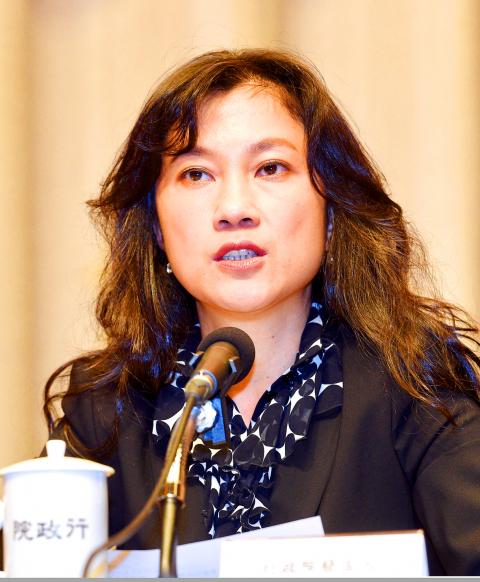The nation would no longer aim to become nuclear-free by 2025 in accordance with the result of Saturday’s referendum, Executive Yuan spokeswoman Kolas Yotaka said on Tuesday.
One of the 10 referendums Taiwanese voted on asked if they agreed that Article 95, Paragraph 1 of the Electricity Act (電業法), which calls for all nuclear power plants to stop running by 2025, should be abolished.
The results showed that 59.5 percent of the nearly 10 million people who voted are against abolishing nuclear power, Central Election Commission figures showed.

Photo: Peter Lo, Taipei Times
The Executive Yuan respects the result and would work with concerned ministries to re-evaluate the nation’s energy policies, Kolas said.
As such, the government would no longer regard 2025 as the deadline, she added.
After the 2011 Fukushima Dai-ichi nuclear power plant disaster in Japan, public opinion took a strong turn against nuclear energy, so the Democratic Progressive Party vowed to phase out nuclear power by 2025, Kolas said.
Although nuclear energy produces less air pollution, the problem of handling and storing nuclear waste remains a serious issue, she added.
The plan to realize a non-nuclear homeland would nevertheless remain the government’s goal for the foreseeable future, Kolas said.
Minister of Economic Affairs Shen Jong-chin (沈榮津) yesterday said that an updated national energy strategy would be formed in two months.
The Ministry of Economic Affairs has also instructed state-run Taiwan Power Co (台電) to submit a stay-of-decommissioning application for the Ma-anshan Nuclear Power Plant in Pingtung County’s Ma-anshan (馬鞍山) to the Atomic Energy Council before July, Shen told reporters on the sidelines of a question-and-answer session at the Legislative Yuan in Taipei.
Ma-anshan’s application is the most feasible, as there is still ample time before its original decommission date, he added.
As the schedule is much tighter for the Guosheng Nuclear Power Plant in New Taipei City’s Wanli District (萬里), a stay of decommissioning would only be considered when there is a power shortage, Shen said.
In keeping with voters’ wishes, the new strategy would prioritize renewable sources, energy conservation and nuclear power, Shen said.
However, the ministry would continue to work with the Executive Yuan to reach a consensus with those affected by the referendum’s outcome, he said, referring to opposition voiced by the Pingtung County Government.
Additional reporting by Ted Chen

INVESTIGATION: The case is the latest instance of a DPP figure being implicated in an espionage network accused of allegedly leaking information to Chinese intelligence Democratic Progressive Party (DPP) member Ho Jen-chieh (何仁傑) was detained and held incommunicado yesterday on suspicion of spying for China during his tenure as assistant to then-minister of foreign affairs Joseph Wu (吳釗燮). The Taipei District Prosecutors’ Office said Ho was implicated during its investigation into alleged spying activities by former Presidential Office consultant Wu Shang-yu (吳尚雨). Prosecutors said there is reason to believe Ho breached the National Security Act (國家安全法) by leaking classified Ministry of Foreign Affairs information to Chinese intelligence. Following interrogation, prosecutors petitioned the Taipei District Court to detain Ho, citing concerns over potential collusion or tampering of evidence. The

‘FORM OF PROTEST’: The German Institute Taipei said it was ‘shocked’ to see Nazi symbolism used in connection with political aims as it condemned the incident Sung Chien-liang (宋建樑), who led efforts to recall Democratic Progressive Party (DPP) Legislator Lee Kun-cheng (李坤城), was released on bail of NT$80,000 yesterday amid an outcry over a Nazi armband he wore to questioning the night before. Sung arrived at the New Taipei City District Prosecutors’ Office for questioning in a recall petition forgery case on Tuesday night wearing a red armband bearing a swastika, carrying a copy of Adolf Hitler’s Mein Kampf and giving a Nazi salute. Sung left the building at 1:15am without the armband and apparently covering the book with a coat. This is a serious international scandal and Chinese

Seventy percent of middle and elementary schools now conduct English classes entirely in English, the Ministry of Education said, as it encourages schools nationwide to adopt this practice Minister of Education (MOE) Cheng Ying-yao (鄭英耀) is scheduled to present a report on the government’s bilingual education policy to the Legislative Yuan’s Education and Culture Committee today. The report would outline strategies aimed at expanding access to education, reducing regional disparities and improving talent cultivation. Implementation of bilingual education policies has varied across local governments, occasionally drawing public criticism. For example, some schools have required teachers of non-English subjects to pass English proficiency

TRADE: The premier pledged safeguards on ‘Made in Taiwan’ labeling, anti-dumping measures and stricter export controls to strengthen its position in trade talks Products labeled “made in Taiwan” must be genuinely made in Taiwan, Premier Cho Jung-tai (卓榮泰) said yesterday, vowing to enforce strict safeguards against “origin laundering” and initiate anti-dumping investigations to prevent China dumping its products in Taiwan. Cho made the remarks in a discussion session with representatives from industries in Kaohsiung. In response to the US government’s recent announcement of “reciprocal” tariffs on its trading partners, President William Lai (賴清德) and Cho last week began a series of consultations with industry leaders nationwide to gather feedback and address concerns. Taiwanese and US officials held a videoconference on Friday evening to discuss the